“One hundred days ago, America’s house was on fire,” President Joe Biden said at his first address to a joint session of Congress — and in many ways, the country looks very, very different since Biden delivered those remarks in April of last year.
Rampant unemployment turned into record economic growth, thanks in large part to the president’s COVID-19 relief bill and economic policies — with the possibility of more on the horizon thanks to his $1.2 trillion bipartisan infrastructure law. Uncertainty surrounding the COVID-19 pandemic gave way to a successful vaccination drive, with more than 215 million Americans — or 65% of the U.S. population — fully vaccinated. The president was greeted this time around by a much larger crowd in a largely maskless House chamber.
“Last year, COVID-19 kept us apart,” Biden said as he began his remarks, flanked on either side by Vice President Kamala Harris and House Speaker Nancy Pelosi — the first time in American history that two women have sat behind a president for a State of the Union. “This year we are finally together again.”
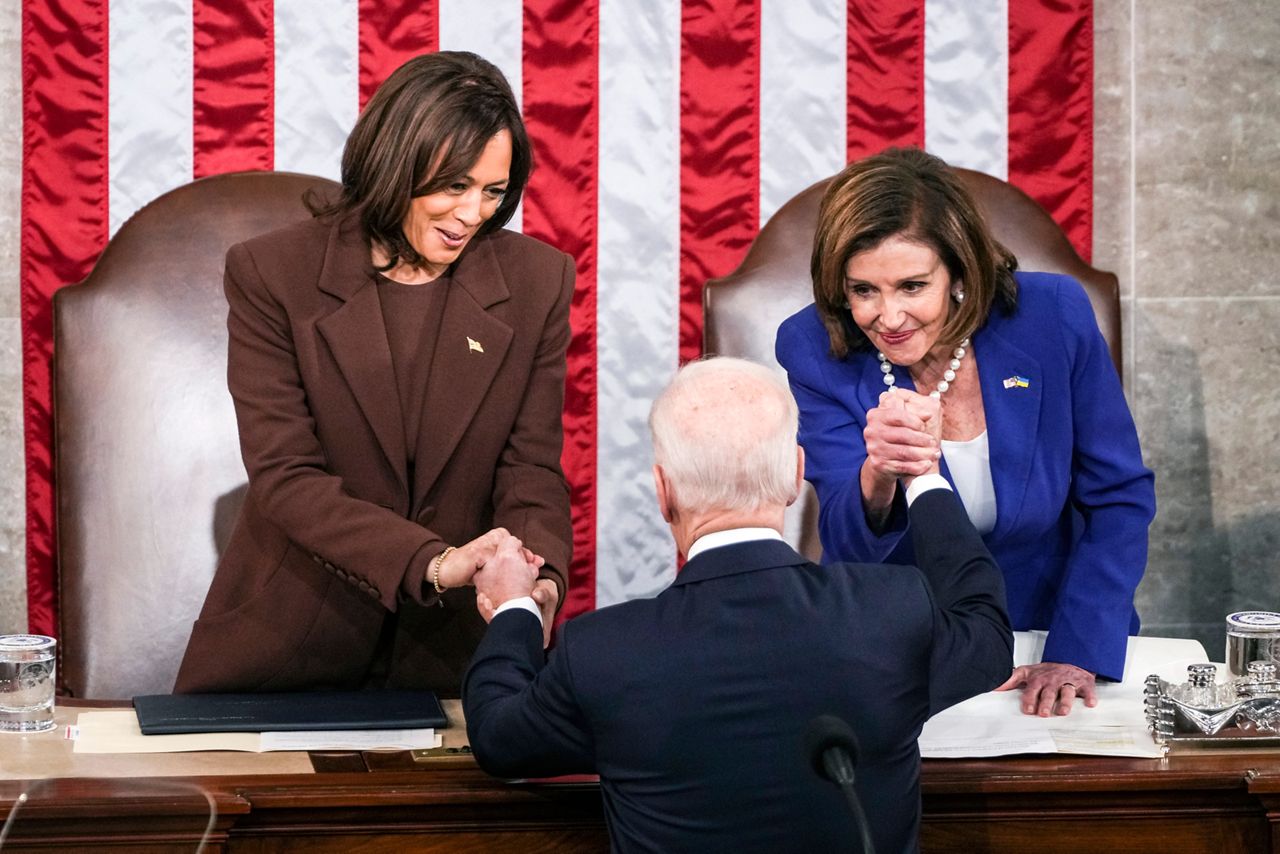
But in many ways, the America of Biden’s first State of the Union as president looks very similar to his previous joint session address.
Despite the record economic growth, the U.S. is also experiencing rampant inflation. Rising consumer prices have hurt Americans’ wallets and been a source of contention for the president’s critics. The third pillar of Biden's economic agenda, the sweeping social spending and climate change measure, the Build Back Better bill, stalled in Congress. The 50-50 Senate has stifled and stymied progress on other progressive issues, including election reform, gun legislation and codifying abortion rights.
The security fencing that surrounded the Capitol during Biden’s last speech, put up following the Jan. 6 attack, returned before the State of the Union, put up “out of an abundance of caution” ahead of possible trucker protests against mask mandates — and yet another reminder of the stark partisan divisions in the country.
It was a fact Biden acknowledged as he opened his remarks: “Tonight, we meet as Democrats, Republicans and independents.
“But most importantly as Americans,” he added, to thunderous applause. “With a duty to one another to the American people to the Constitution. And with an unwavering resolve that freedom will always triumph over tyranny.”
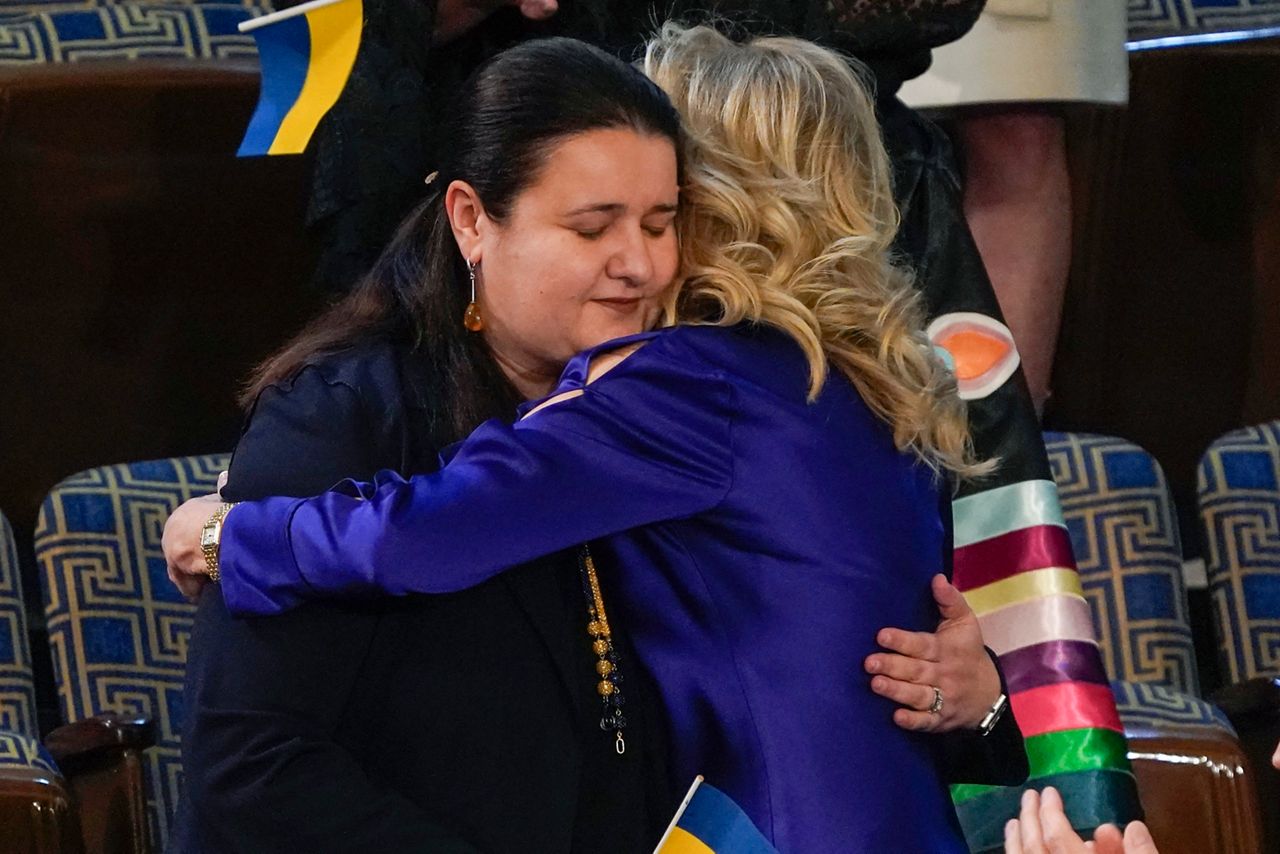
Biden quickly moved to address the Russian invasion of Ukraine in his speech, hailing the Ukrainian people and their leader, Volodymyr Zelenskyy.
“Six days ago, Russia’s Vladimir Putin sought to shake the foundations of the free world, thinking he could make it bend to his menacing ways,” Biden said. “But he badly miscalculated. He thought he could roll into Ukraine and the world would roll over. Instead, he met a wall of strength he never imagined. He met the Ukrainian people.
“From President Zelenskyy to every Ukrainian, their fearlessness, their courage, their determination, inspires the world,” the president said, to cheers and applause from the crowd.
Biden acknowledged Oksana Markarova, the Ukrainian ambassador to the United States, who sat with first lady Jill Biden and received a standing ovation from the crowd. He urged: “Let each of us here tonight in this chamber send an unmistakable signal to Ukraine and to the world."
The president extolled the importance of the NATO alliance in coming together quickly to punish Russia for its actions in Ukraine.
“American diplomacy matters,” Biden said. “American resolve matters. Putin’s latest attack on Ukraine was premeditated and unprovoked. He rejected repeated efforts at diplomacy. He thought the West and NATO wouldn’t respond. And he thought he could divide us at home.
“Putin was wrong,” he said. “We were ready.”
The president made clear that the sanctions the U.S. and its allies have placed on Russia are working: “The ruble has lost 30% of its value. The Russian stock market has lost 40% of its value, and trading remains suspended. Russia’s economy is reeling, and Putin alone is to blame."
Biden made two announcements related to Ukraine in his address: joining allies in closing U.S. air space to all Russian flights — “further isolating Russia” — and releasing 30 million barrels of oil from the Strategic Petroleum Reserve, for a total of 60 million barrels with allies, to “help blunt gas prices here at home."
Biden also said that the Justice Department is “assembling a dedicated task force to go after the crimes of Russian oligarchs.”
“We are joining with our European allies to find and seize your yachts, your luxury apartments, your private jets,” he said. “We are coming for your ill-begotten gains.”
The president also pledged $1 billion in direct assistance to Ukraine, “and we will continue to aid the Ukrainian people as they defend their country and to help ease their suffering,” but he promised that U.S. troops “are not engaged and will not engage in conflict with Russian forces in Ukraine.”
“Our forces are not going to Europe to fight in Ukraine, but to defend our NATO allies – in the event that Putin decides to keep moving west,” Biden said, adding: “For that purpose, we’ve mobilized American ground forces, air squadrons and ship deployments to protect NATO countries, including Poland, Romania, Latvia, Lithuania and Estonia. As I have made crystal clear, the United States and our allies will defend every inch of territory of NATO countries with the full force of our collective power.
“The Ukrainians are fighting back with pure courage,” Biden promised. “But the next few days, weeks, months, will be hard on them. Putin has unleashed violence and chaos. But while he may make gains on the battlefield, he will pay a continuing high price over the long run.
“A Russian dictator, invading a foreign country, has costs around the world,” Biden pledged.
“I know what’s happening can seem alarming,” the president said to the American people. “But I want you to know that we are going to be OK. When the history of this era is written, Putin’s war on Ukraine will have left Russia weaker and the rest of the world stronger.
“In the battle between democracy and autocracy, democracies are rising to the moment, and the world is clearly choosing the side of peace and security,” Biden said. “This is a real test. It’s going to take time. So let us continue to draw inspiration from the iron will of the Ukrainian people.
“To our fellow Ukrainian-Americans who forge a deep bond that connects our two nations, we stand with you,” Biden pledged.
“Putin may circle Kyiv with tanks, but he will never gain the hearts and souls of the Ukrainian people,” he added. “He will never extinguish their love of freedom. He will never weaken the resolve of the free world.”
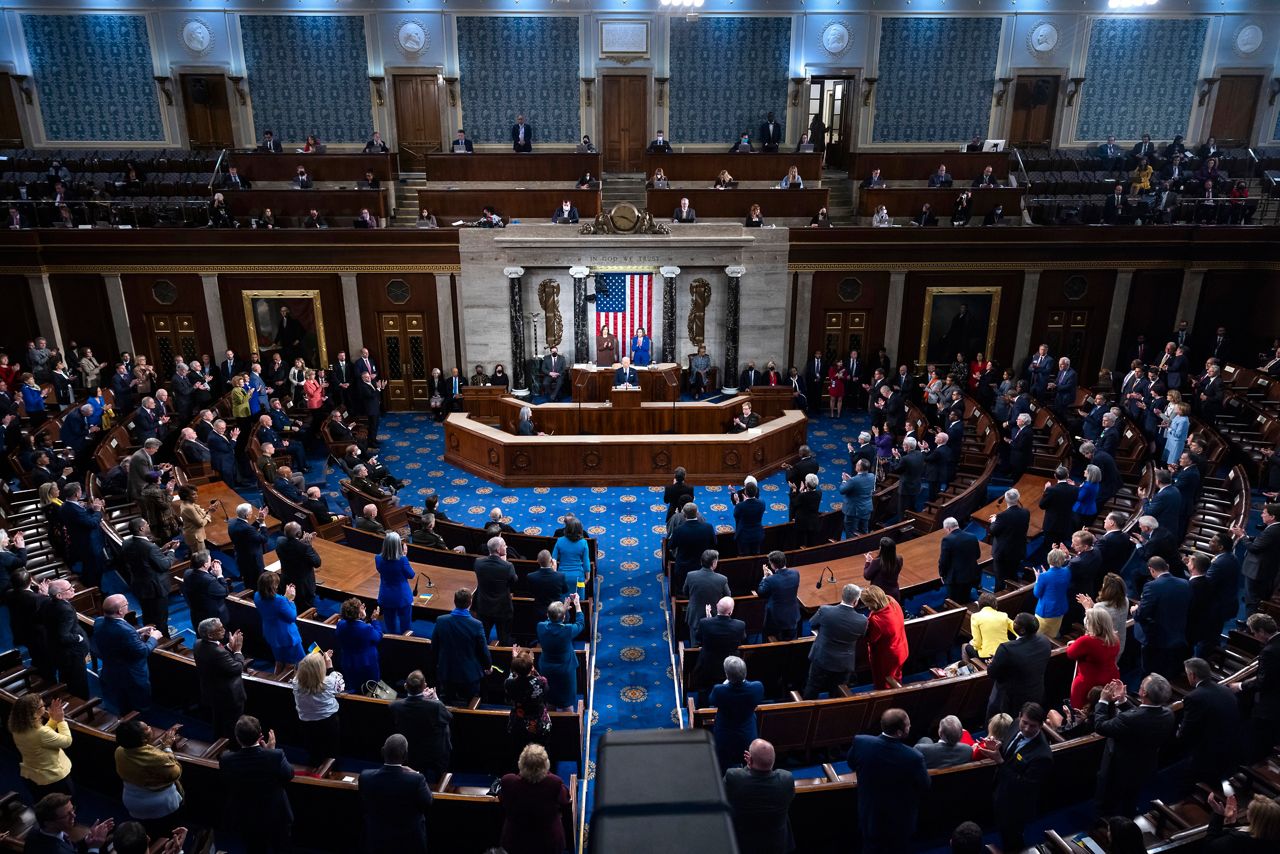
The first year of Biden’s presidency was plagued by the coronavirus pandemic – and while he warned that he could not promise a new variant won’t emerge, the president also expressed optimism over the country’s response to the disease.
When he took office, just over 15 million Americans were vaccinated against COVID-19; as of Tuesday, over 215 million were fully inoculated.
Biden urged the country to “use this moment to reset,” touting the progress made in the past year in areas including vaccinations, treatment options and more.
“Thanks to the progress we have made this past year, COVID-19 need no longer control our lives,” he said. “I know some are talking about ‘living with COVID-19.’ Tonight, I say that we will never just accept living with COVID-19.”
The change was evident in Congress itself, the first time the majority of lawmakers have attended a maskless meeting in nearly two years.
Harking back to his first months in office, Biden touted the passage of the $1.9 trillion American Rescue Plan, signed into law in March of last year.
“Few pieces of legislation have done more at a critical moment in our history to lift us out of crisis,” Biden said Tuesday. “It fueled our efforts to vaccinate the nation and combat COVID-19. It delivered immediate economic relief to tens of millions of Americans.”
Funds from the American Rescue Plan were dispersed relatively quickly after Biden signed the bill into law on March 12, 2021. According to a report from the Treasury Department, over $700 billion was released by Sept. 16, $450 billion of which was given directly to families or households. Some funds, like the second round of Coronavirus State and Local Fiscal Recovery Funds, will be released in the coming months.
Biden announced Tuesday that he directed the Department of Justice to focus on combating criminal fraud and theft in pandemic relief programs. The DOJ will appoint a prosecutor to focus on issues such as identity theft and other complex fraud schemes and will initiate an interagency fraud enforcement task force, among other efforts.
“We’re going after the criminals who stole billions in relief money meant for small businesses and millions of Americans,” he said.
Biden also unveiled his administration’s four-step plan to move into the next phase of pandemic response, saying: “We will continue to combat the virus as we do other diseases. And because this is a virus that mutates and spreads, we will stay on guard.”
One new effort will be a “Test to Treat” initiative, wherein Americans who test positive for COVID-19 at a pharmacy can receive antiviral pills at no cost.
“If you’re immunocompromised or have some other vulnerability, we have treatments and free high-quality masks,” Biden said. “We’re leaving no one behind or ignoring anyone’s needs as we move forward.”
Still, Biden stressed the need to prepare for new variants that may emerge, saying it will be imperative to have the ability to “deploy new vaccines within 100 days instead of many more months or years.”
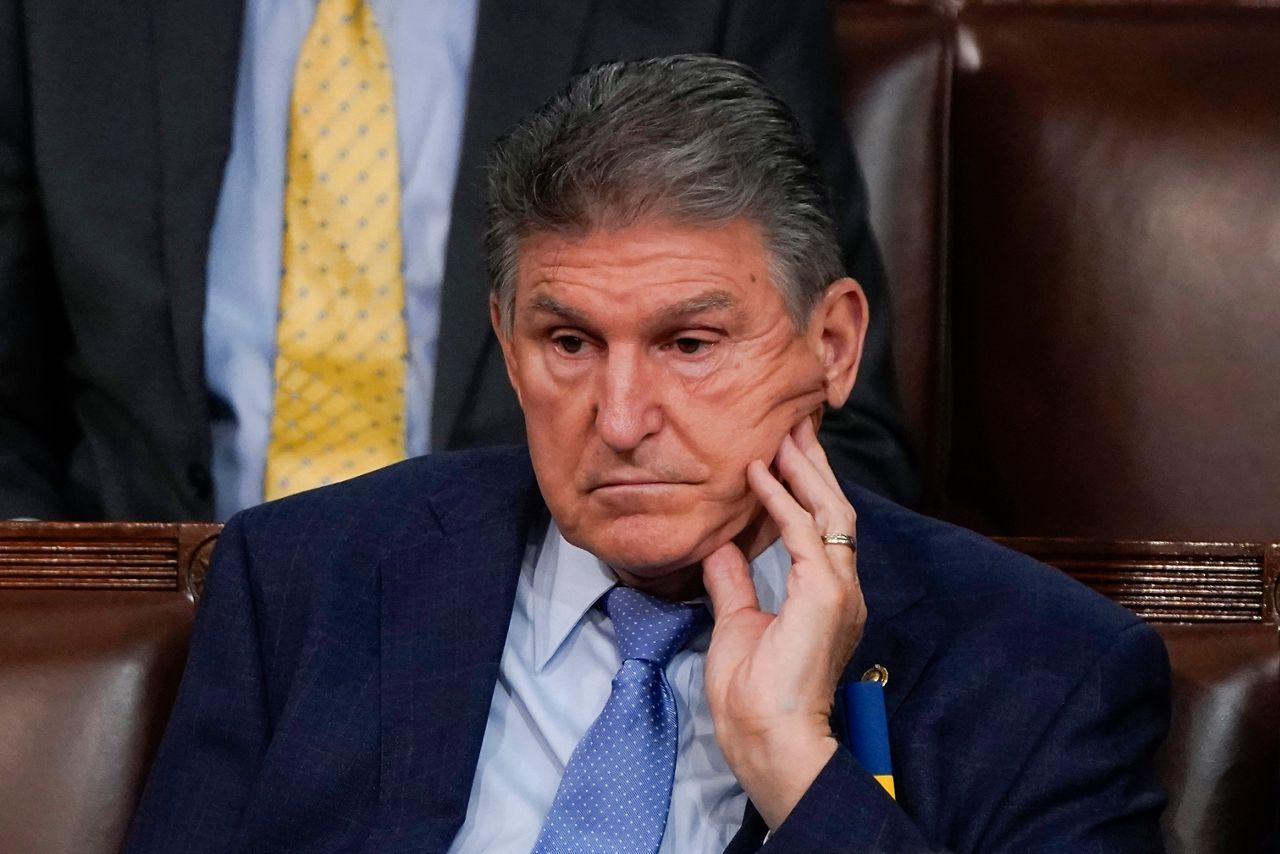
In the year since Biden’s previous address to a joint session of Congress last April, the United States has seen a historic job growth and economic recovery, thanks in large part to the American Rescue Plan.
The United States’ economy grew by 5.7% in 2021, the fastest rate in a full year since the 1980s. Congress also passed the $1.2 trillion infrastructure bill in a widely bipartisan fashion, which, taken with the ARP, comprised two-thirds of Biden’s agenda.
Still, Biden acknowledged that while job growth and the country's economic recovery, inflation has hit Americans hard. Rising consumer prices, including at the gas pump, have hurt Americans’ wallets and been a source of contention for the president’s critics.
“Too many families are struggling to keep up with their bills,” Biden said. “Inflation is robbing them of gains they thought otherwise they would be able to feel. I get it. That's why my top priority is getting prices under control.”
Gas prices were already on the rise before Russia invaded Ukraine last week, which caused the prices of crude oil to jump to its highest levels since 2014 as countries – including the United States – sanctioned Russia as a consequence for its actions.
Hours before Biden’s address, the White House and the International Energy Agency announced Tuesday the release of 60 million barrels of oil to aid global supply in a bid to keep prices from rising further.
“These steps will help blunt gas prices here at home. And I know the news about what’s happening can seem alarming,” Biden said. “But I want you to know that we are going to be okay.”
Biden touted his stalled Build Back Better plan as the solution to rising inflation, which is at a 40-year high. He called for increasing domestic manufacturing capacity in order to help lower prices.
“One way to fight inflation is to drive down wages and make Americans poor,” he said. “I think I have a better idea to fight inflation — lower costs, not your wages.”
The White House on Monday outlined President Biden’s four-point plan to lower costs for American families:
- Increasing American manufacturing and production, strengthening domestic supply chains and moving items faster and cheaper
- Reducing everyday expenses for Americans while also reducing the deficit
- Promoting fair competition and aiding small businesses
- Eliminating barriers to good-paying jobs for workers nationwide
“Make more cars and semiconductors in America," Biden said. "More infrastructure and innovation in America. More goods moving faster and cheaper in America. More jobs where you can earn a good living in America. And, instead of relying on foreign supply chains, let’s make it in America.”
The president also said he wants to slash the prices of prescription medication, in part by allowing Medicare to directly negotiate prices with drugmakers. Biden also called for cutting energy costs by providing tax credits to Americans and businesses that weatherize their homes and facilities, and by doubling clean energy production. He also urged Congress to renew the expanded child tax credits passed in the American Rescue Plan.
The president again promised that the sweeping package could be paid for without raising taxes on anyone earning less than $400,000 a year, but rather through tax hikes on the wealthy and corporations.
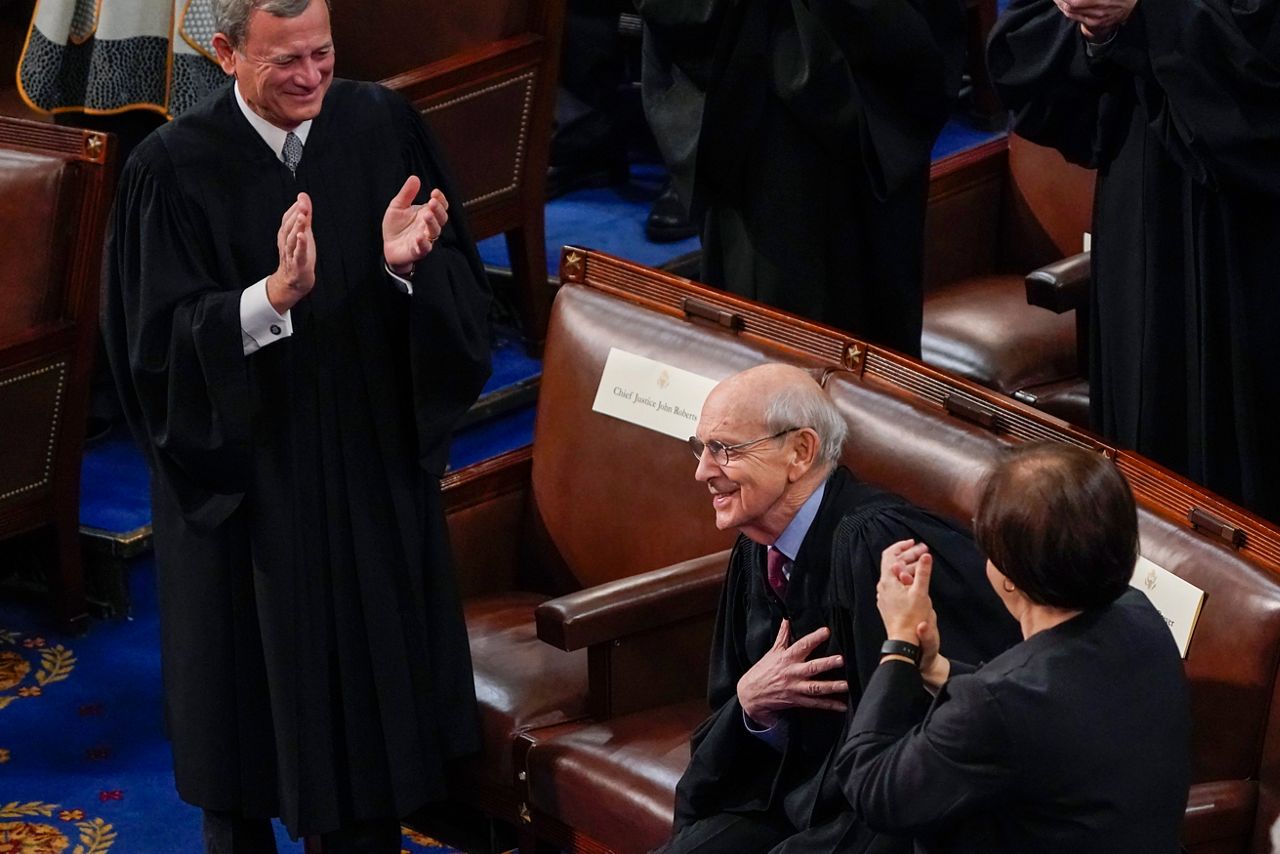
The president spent much of his address touting the passage of two significant bills – the $1.9 trillion American Rescue Plan and the $1.2 trillion Bipartisan Infrastructure Law – and the impact they have already made on Americans’ lives, while also highlighting future changes to come thanks to funding from the two packages.
Funds from the Bipartisan Infrastructure Law will be dispersed over the next five years, but will also create a “visible impact” on Americans by the end of 2022, the White House said Tuesday. Infrastructure repair and fortification projects will commence this year on over 65,000 miles of roads, 1,500 bridges, 600 airports, 500 ports and waterways, 15,000 acres of abandoned mines and more.
Biden and members of his administration have criss-crossed the United States in recent months to tout such projects, ranging from a series of waterway cleanups around the Great Lakes to a restoration of crumbling infrastructure in the South.
“America used to have the best roads, bridges, and airports on Earth. And now our infrastructure is ranked 13th in the world,” Biden said, adding of the infrastructure law: “This was a bipartisan effort, and I want to thank the members of both parties who worked to make it happen.”
The president also highlighted a number of other promises kept during his first year in office, including his pledge to nominate the first Black woman to the Supreme Court.
Biden recently tapped Judge Ketanji Brown Jackson as his pick to replace the retiring Justice Stephen Breyer on the nation’s highest court.
“One of the most serious constitutional responsibilities a president has is nominating someone to serve on the United States Supreme Court,” Biden said Tuesday night. “And I did that four days ago when I nominated Circuit Court of Appeals Judge Ketanji Brown Jackson, one of our nation’s top legal minds, who will continue Justice Breyer’s legacy of excellence.
“A former top litigator in private practice, a former federal public defender and from a family of public school educators and police officers,” he said of Jackson. “She’s a consensus builder. Since she’s been nominated, she’s received a broad range of support — from the Fraternal Order of Police to former judges appointed by Democrats and Republicans.”
Biden took time to honor Breyer as well, who appeared humbled and bashful as the president sang his praises, at one point covering his face and putting his hands over his heart.
“An Army veteran, constitutional scholar and retiring justice of the United States Supreme Court,” Biden said. “Justice Breyer, thank you for your service.”
Other early-day achievements included fulfilling his promise to rejoin the World Health Organization and the Paris Climate Agreement, rescinding the ban on transgender individuals serving in the military, resuming ties with Palestinians and increasing COVID-19 testing nationwide, among others.
The president still has much to work to do during his remaining years in office. According to Politifact, Biden kept 16 of the 99 promises made on the campaign trail; another three were listed as a compromised achievement, with 46 promises ranked as in the works and 24 as stalled.
Biden outlined a number of priorities Tuesday as part of his administration’s “unity agenda,” which will focus on policy areas that enjoy high bipartisan support and therefore have a better chance of getting legislation passed through Congress.
One of those issues is the growing mental health crisis in the United States, particularly among adolescents and school-aged children. Experts in the U.S. have for months warned that adolescents are undergoing an “alarming” and “widespread” mental health crisis, an uptick that was already in motion before COVID-19 took hold, but has also been worsened by the ongoing pandemic.
Biden on Tuesday called on Congress to take aggressive steps to protect children from online harm, an issue for which both Democrats and Republicans have expressed vocal support.
“Let’s take on mental health, especially among our children, whose lives and education have been turned upside down” by the pandemic, Biden said. “The American Rescue Plan gave schools money to hire teachers and help students make up for lost learning.
“I urge every parent to make sure your school does just that,” he urged. “And we can all play a part — sign up to be a tutor or a mentor.
“Children were also struggling before the pandemic: bullying, violence, trauma and the harms of social media,” Biden said, before acknowledging Frances Haugen, the former Facebook product manager-turned-whistleblower on the social media giant.
“We must hold social media platforms accountable for the national experiment they’re conducting on our children for profit,” Biden said. “It’s time to strengthen privacy protections, ban targeted advertising to children, demand tech companies stop collecting personal data on our children. And let’s get all Americans the mental health services they need."
Biden also said he was committed to ensuring veterans, which he called "the spine of this country," receive the health care they need, especially those exposed to burn pits.
“These burn pits incinerate waste, the waste of war — medical and hazardous material, jet fuel and so much more,” Biden said. “And they come home, many of the world's fittest and best trained warriors in the world, never the same. Headaches, numbness, dizziness, a cancer that would put them in a flag-draped coffin.”
Biden said he wasn’t certain if the burn pits his son, National Guard Maj. Beau Biden, lived near while stationed in Iraq and Kosovo, caused the brain cancer that killed him in 2015, but the president said, “I am committed to find out everything we can” for military families.
Biden announced that Veterans Administration benefits are being expanded to cover veterans suffering from nine respiratory cancers. He also called on Congress to pass a law to ensure veterans exposed to toxic chemicals in Iraq and Afghanistan receive comprehensive health care.
The president described his administration’s new three-pronged approach to transform the nation’s mental health care system, which will focus on strengthening overall system capacity, connecting more Americans to potentially life-saving care and a whole-of-society effort to create healthy environments at home, in school and online.
“More people can turn for help, and full parity between physical and mental health care, if we treat it that way in our insurance,” Biden said Tuesday evening.
Some of the new programs will be funded in Biden’s FY2023 budget, which he hopes will give over $700 million to training initiatives for behavioral health professionals. By this fall, the Department of Health and Human Services expects to award $225 million to train paraprofessionals in community health, behavioral health support and other areas of mental health treatment.
The budget will also call for a $5 million investment to research emerging treatments for mental and behavioral health conditions. Other requests in the president’s budget will include $50 million for pilot models to put mental health services in “non-traditional” settings, a $1 billion allocation to help schools hire additional counselors and a $5 million request to advance research on the detrimental effects of social media on adolescents.
Touting his administration’s efforts at making communities safer and reducing gun crime – including cracking down on the so-called “Iron Pipeline” of illegal guns sold in the South and found at crime scenes as far north as New York – Biden urged Congress to pass “commonsense gun violence prevention legislation,” which includes requiring universal background checks, banning assault weapons and high-capacity magazines, repealing liability for gun manufacturers, mandating that no terrorist can buy weapons in the U.S. and banning so-called “ghost guns.”
“Why should anyone on the terrorist list be able to purchase a weapon?” Biden asked. “Ban assault weapons and high-capacity magazines of up to 100 rounds. You think the deer are wearing kevlar vests?”
Biden also noted that $350 billion included in the American Rescue Plan is available for communities suffering from gun violence to both hire more police and invest in evidence-based community intervention programs. In June, the White House highlighted a handful of CVI programs, noting that these programs may cause violence to fall by 60%.
Last year, 15 communities across the country joined with the White House to collaborate on CVI infrastructure and study. Among them is Los Angeles, which expanded a partnership with a local mental health provider to provide direct assistance on nonviolent crisis calls, as well as an unarmed crisis-response program.
“We should all agree the answer is not to defund the police, but to fund them,” Biden said. “Fund them with resources and training they need to protect our communities.”
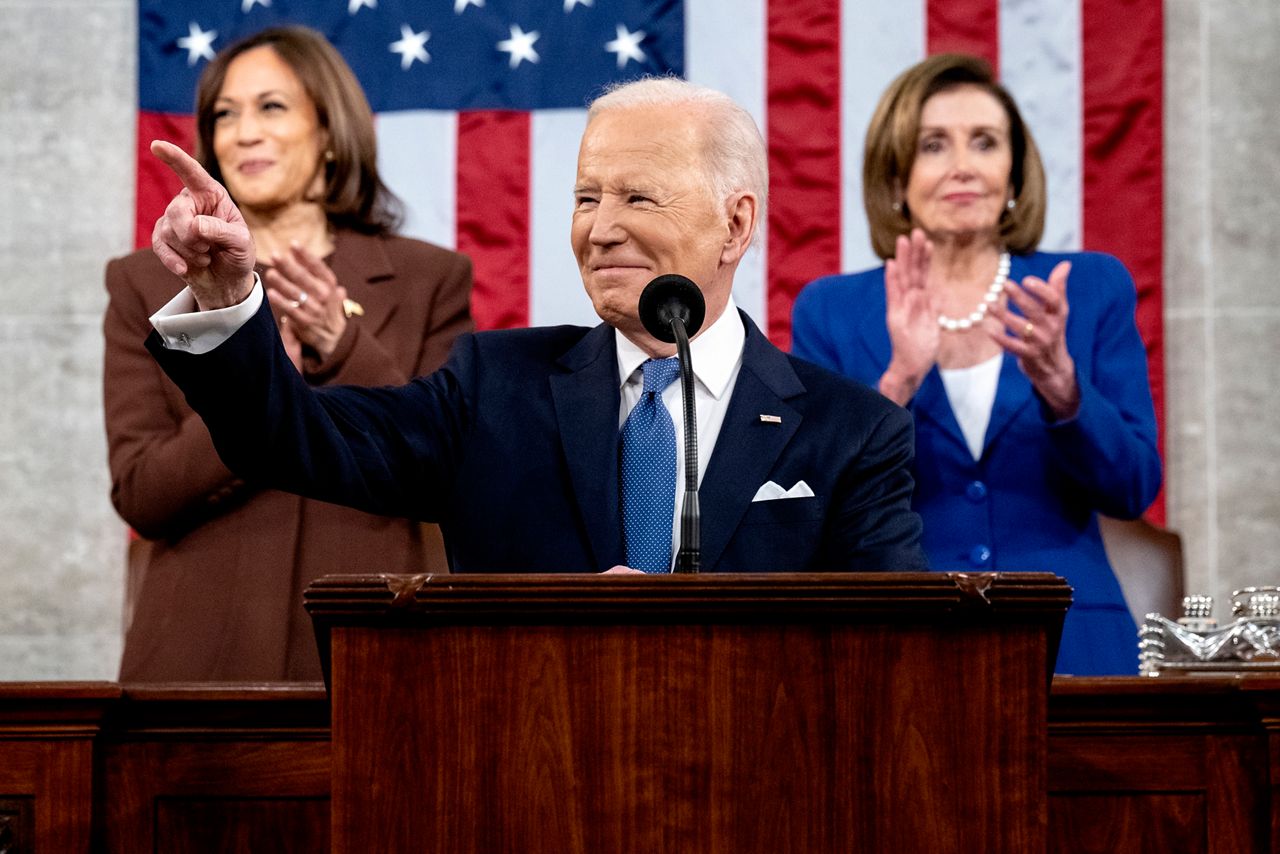
The State of the Union came at a precipitous time for the president – amid falling approval ratings and ahead of a crucial midterm election cycle, with both parties vying for control of Congress in eight months’ time – but also offered Biden an opportunity to reset and lay out a clear path forward for the country.
Biden seized upon the opportunity in his speech Tuesday night, presenting his agenda as a challenge to the country in a critical time.
"Tonight, we have gathered in a sacred space — the citadel of our democracy," Biden said. "In this Capitol, generation after generation, Americans have debated great questions amid great strife and have done great things. We have fought for freedom, expanded liberty, defeated totalitarianism and terror, built the strongest, freest and most prosperous nation the world has ever known.
"Now is the hour, our moment of responsibility, our test of resolve and conscience, of history itself," he said. "It is in this moment that our character is formed, our purpose is found, our future is forged."
Biden said that the U.S. "will meet the test to protect freedom and liberty, to expand fairness and opportunity. We will save democracy."
The president said that he is "more optimistic about America today" than in his entire life, "because I see the future that is within our grasp. Because I know there is simply nothing beyond our capacity."
"We are the only nation on Earth that has always turned every crisis we have faced into an opportunity," he said. "The only nation that can be defined by a single word: possibilities.
"So on this night, in our 245th year as a nation, I have come to report on the State of the Union," he said. "And my report is this: The State of the Union is strong, because you, the American people, are strong.
"We are stronger today than we were a year ago, and we will be stronger a year from now than we are today," Biden added. "Now is our moment to meet and overcome the challenges of our time. And we will. As one people. One America. The United States of America."



